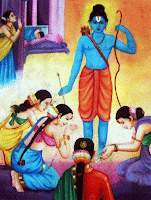Living in the warmer south of the country, I always have looked forward to these two months of December and January which people here refer to as 'cold' months. They wear woollen caps or mufflers and drape shawls over the shoulders most of the mornings and late evenings.
I love the nip in the air and the sharp wind that tickles the tip of the nose and the cheek bones. The sunlight feels wonderful. And music flows in the air, engulfing me in the perfect symphony!
Yes, it is the time for slowly losing myself, edges blurred, in the rhythm of life all around me. My memory associates the early morning ritual of designing different 'kolams' at the entrance of the house, the 'Dhanur masa pooja in the temples and yes the 'pongal' with cashews and the biting and hot pepper during the cool mornings with this time, particularly the month of 'Markazhi' (மார்கழி) in Tamil. The time between 16th of December to 13th of January in the Indian tradition is referred to as the ninth month, (Agrahāyaṇa ) or मार्गशीर्ष - Mārgaśirṣa.
The house I grew up in had a broad pavement made of cement slabs and my neighbour and close friend had the same kind of space to display her designs. So there began a subtle competition - in different layers about different aspects like who was the first to fill the entrance with a kolam, the size and the type of kolam.
The competition still goes on and now manifests itself in complex layers. Age and experience have added nuances to it and technology aids us efficiently. More than anything, there is an effortless sharing and adapting between us. My friend's designs influence the wonderful women in her other group to put together a bouquet of words in beautiful verses in Thamizh. The creation of kolam is no more a mere dots and lines but manifestation of deep reflection and meditation on our part.
My reflection took me to the origin of the observation of this 'vrath' or 'நோன்பு ' (like taking a vow or keeping a fast) during Markazhi. Andal, the Bhakthi saint who was devoted to God Vishnu, is said to have observed this Vrath called 'Paavai nonbu. Paavai in Thamizh means a doll or an image. All through the month of Markazhi, young girls would wake up before sunrise (Brahma Muhurat) ,go to nearby rivers/tanks and take bath. This is the last quarter of night; time of Brahman, which starts around 4.24 am local time and goes up to 5.30 am . It is considered an auspicious time for practices of yoga and most suitable for meditation or worship. It can translate as 'Creator's time'. In some other parts of the country, during the same time, Kathyayani Vrat is observed by young girls. This Vrat has been mentioned in Bhagavatha Purana, Devi Mahahmiyam, Skanda Purana and Taitiriya Aranyaka.
And how would the young girls observe their 'nonbu? They would create an image of goddess from the clayey soil and pray to get good husbands.(Since the dawn of urbanisation and civilisation, patriarchy is well entrenched in human life.) But then, the 'vrath' was meant for the well being of all as well.
Andal had taken this to a new height when she prayed to be united with Vishnu Himself. Immersed in that sense of devotion (Bhakthi), she saw herself as one of the Gopi and her community as the Yadava community (shepherd) of Gokulam. The thirty verses known as 'Thiruppaavai' - one verse each for every day of this holy month - bring out the Bhakthi of Andal to the exclusion of all material things.
What strikes me immediately is the simple but sweet pattern in which the words flow into beautiful lyrics. Her love for the Lord and care for all the living beings shine through her verses. She adds the many stories about Krishna, Rama or Narasimha and there is a lively banter when the friends and Andal from outside wake up the sleeping friend inside the house. Sometimes, it is an affectionate and gentle call like "Hey, Little parrot!( எல்லே, இளங்கிளியே !); at other times, it is a teasing way to bring the person inside like wondering whether Kumbakarna (Ravana's brother, known for his months long sleeping), had given away his sleep to the friend inside the house after his defeat.
"...….. பண்டொருநாள்
 I love the language and the beautiful verses and I love to sing them as well. The cool days with the lazy warm caressing sunlight, the bite in the air which tickles the tip of the nose and cheeks, the distant chiming of temple bells and the strains of devotional songs including Thiruppaavai and Thiruvempavai moving along the wind - all infuse me with energy.
I love the language and the beautiful verses and I love to sing them as well. The cool days with the lazy warm caressing sunlight, the bite in the air which tickles the tip of the nose and cheeks, the distant chiming of temple bells and the strains of devotional songs including Thiruppaavai and Thiruvempavai moving along the wind - all infuse me with energy.


















கருத்துகள் இல்லை:
கருத்துரையிடுக